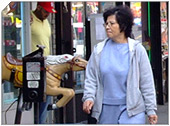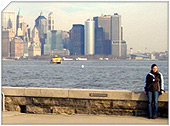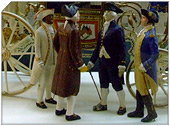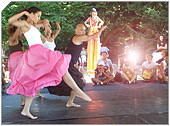Getting Started
Index
NYC Neighborhoods
Manhattan
Brooklyn
Queens
Bronx
Staten Island
NYC Icons
Chrysler Building
Flatiron Building
Empire State Building
Safe NYC
NYPD
FDNY
NYC Weather
NYC Climate
NYC Weather Forecast
Winter Season
Spring Season
summer Season
Fall Season
NYC History & Politics
New York City History
Tammany Hall and Politics
New York City Politicians
New York City Personalities
Culture of Gotham City
Culture of the city
Cultural diversity
City in popular culture
|
Johnny Thunders, born John Anthony Genzale, Jr (July 15, 1952 - April 23, 1991), was a rock and roll guitarist and singer, first with the New York Dolls, the proto-punk glam rockers of the early '70s. During the late '70s, he was a familiar figure on the New York punk scene, both with The Heartbreakers and as a solo artist. His screeching, penetrating guitar sound is distinctive and highly influential in punk rock music. Thunders tangled with the demons of fame along with alcohol and drug addiction.
Biography
John Genzale was born July 15, 1952, and grew up in Queens, NY. As a youngster he played baseball but couldn't join the Little League as it required the presence of the youth's father . Under the name "Johnny Volume", Genzale began performing music in high school with "Johnny and the Jaywalkers"; after leaving that band, he joined "Actress", which featured future Dolls Arthur "Killer" Kane and Billy Murcia. "Actress" became the New York Dolls in 1971 and Genzale renamed himself Johnny Thunders.
After recording two critically acclaimed but commercially unsuccessful albums - The New York Dolls and Too Much Too Soon - the Dolls broke up. The early Dolls recordings are still in print today and continue to influence young bands with their trash/glam/punk attitude.
He formed The Heartbreakers with Dolls drummer Jerry Nolan, ex-Demons guitarist Walter Lure and Television bassist Richard Hell, who left soon after to form Richard Hell and the Voidoids. Hell was replaced by Billy Rath.
With Thunders leading the band, the Heartbreakers toured America and Britain, releasing one official album, L.A.M.F., in 1977. L.A.M.F. is a punk classic that documents the important bridge between the U.S. and U.K punk scenes. The group relocated to the UK, where their popularity was significantly greater than it was in the U.S., particularly among punk bands.
In late 1979 Thunders began performing in a band called Gang War. Other members included John Morgan, Ron Cooke, Philippe Marcade and former MC5 guitarist Wayne Kramer. They recorded several demos and performed live several times before disbanding, with Zodiac Records releasing an EP in 1987. Bootlegs of their demos and live performances are circulating; One semi-official live/studio vinyl only LP was released on Zodiac in 1990, credited to Thunders and Kramer and titled Gang War, it is easily available from specialist retailers.
Thunders recorded a number of solo albums beginning with So Alone in 1978. The album was laid down in drug laden sessions with all the swirling turbulence of an atomic explosion. The complex bittersweet sound is a standard that many bands aspire to emulate and it is universally hailed as Johnny Thunders' masterpiece. It featured guests such as Phil Lynott, Chryssie Hynde, Steve Marriott, Paul Cook, Steve Jones, Walter Lure, Billy Rath, and Peter Perrett of The Only Ones. The core of the band on the album included Thunders, Lynott, Cook, and Jones. After its release, Thunders and Sex Pistols ex-bassist Sid Vicious played in the Living Dead for a short time. The CD version of the album contains four bonus tracks, including the single "Dead or Alive," one of Thunders' finest post-Dolls moments.
During the early '80s, Thunders re-formed The Heartbreakers for various tours; the group recorded their final album in 1984.
In 1985, he released Que Sera Sera, a collection of new songs that showed he could still perform convincingly. Three years later he recorded an album of rock and R&B covers with vocalist Patti Palladin, Copy Cats.
Thunders kept performing and recording until his death in 1991, but problems with heroin addiction kept his output and songwriting sporadic during the 1980s.
Thunders always had a loyal following. No doubt there would be many more fans if not for the uneven performances and lack of good publicity. The flood of bootleg recordings has never slowed. Amongst his last recordings were the live concerts in Japan that show a mature, and surprisingly clean, Johnny Thunders.
His final recording was a cover of "Born to Lose" with German punk rock band Die Toten Hosen, recorded some 36 hours before Thunders' death.
|
New York City Search
Quick NYC
|



 New York Weather Forecast
New York Weather Forecast
 Ethnic composition
Ethnic composition


















